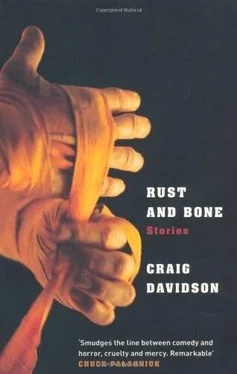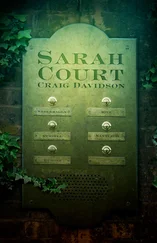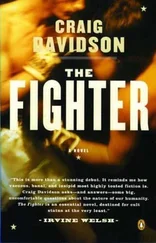“You’re breaking him down,” Jack lied. “Stick and move, Eddie.”
By the final round the Mexican looked slightly ashamed. He ducked punches nimbly, sticking a soft jab in my face or tying me up in close. A chorus of boos arose: the shadowy bar patrons were anticipating a KO. The only damaging shot I landed all night was a right hook to the Mexican’s crotch. It wasn’t on purpose: my eyes were so swelled I couldn’t see what I was punching. He took the foul in good spirit, pulling me close until our heads touched, whispering, “ Cuidado, lo blo, cuidado .”
Afterwards I sat on the trunk of Jack’s Chevelle pressing an icepack to my neck. There was a tinny ringing in my ears and the moon held a wavering penumbra. I concentrated on not throwing up. Contrales handed over my fight purse: five dollars, management fee and transportation surcharge deducted.
“You were tight. Gotta let go with a few bombs or you get no respect. He laid your ass on the canvas five or six times, but you stood up. Counts for something, right? Little bastard was sharp,” Jack admitted. “A dead game fighter.”
I nodded vaguely, not paying much attention, more concerned with how I’d explain my state to my folks.
“You fight, you lose. You fight, you win. You fight,” Jack suggested, heading back inside for a fifth of off-sale Johnny Red.
The Mexican exited Rosalita’s. He moved out into the cane, clearing the razor-edged stalks from his path with still-taped hands. Spokes of heat lightning flashed behind a bank of night clouds, whetting the foothills in crimson light. The fighter walked gingerly, no wasted movement. He stopped at a grove of palmettos and glanced up at a low bronze moon, orienting himself to the land before melting into the trees. I thought about the coming hours as he hiked to the border and scaled the fence, where perhaps a boat was moored amidst the cattails. He’d battle the Rio Grande’s currents as they bore him to the far shore, then another hike would bring him to an adobe house in one of the fringing settlements. I pictured his wife and children: his wife’s oval face and fine-boned hands, shafts of dawn sunlight slanting lowangled and orange through an open window to touch his daughter’s sleeping eyes. The fantasy may’ve stood in sharp contrast to the abject reality—perhaps the man had nothing worth fighting for—perhaps all that waited was a lightless room, a bottle of mescal.
Looking back now, I do not believe that was the case. Reach a certain experience level, you don’t fight without reason. You’ve seen too many boxers hurt, killed even, to treat matches as dick-swinging contests. Fighting becomes a job, stepping into the ring punching a clock. It’s a pragmatic pursuit, opponents’ equations to be solved using the chimerical physics of reach, height, spacing, leverage, heart. You’d no more fight outside the ropes than a factory lineman would work a shift for no pay. I entered my first fight for no other reason than to see if I could, testing what I thought I’d known against the unknown reality. I lost because I was green, yes, but also because nothing was really at stake: my life wouldn’t’ve been substantially better or worse, win or lose. The Mexican stepped between the ropes with the subdued air of a man entering an office cubicle. When he realized it was going to be an easy day he leaned back in his chair, kicked off his shoes. He didn’t give the crowd what they wanted, didn’t hurt me without cause. His job was to defeat his opponent, and he did. But he wouldn’t be there without reason. He fought for the money, and for those he loved.
A family waited on the other side of that river. I know that now. I know what it means to fight for a reason.
The hallway’s lit by forty-watt bulbs set behind meshed screens. The cement perspires, as do the oxidized copper pipes overhead. Rivulets of brown water spill from the joists. The place is a foreclosed steelworks factory. Corkscrews of drilled iron crunch beneath my boots. The air smells of mildewed rock and ozone. Up through the layers of concrete and wires and piping the crowd issues a gathering buzz that beats against my eardrums.
We fight bare-knuckle, or nearly so. A nostalgic few see it as a throwback to the days when barrel-chested dockhands brawled aboard barges moored off the New York harbor. It’s not throwback so much as regression. A dogfight. No referees. No ten count. The winner is the man left standing. Rabbit punches and low blows, eye gouges, head-butts—I once saw a fishhook tear a man’s face open, lip to high ear. Fighters score their hand wraps with sandpaper, soak them in turpentine, wind concertina wire around their knuckles.
I fight fair. Try to, anyhow.
I graduated high school in the spring of 1984. Excelling at English and Languages, I was accepted to Wiley College on a scholarship. That August I moved north to Marshall and spent three years living in my sister Gail’s basement, studying and continuing to box. Gail’s husband Steve was a journeyman carpenter and drywaller; he converted the unfinished basement into an apartment: bedroom and kitchenette, a small training area to skip rope and practice footwork. I’d squirrel myself away during midterms and finals, but otherwise spent my time reading in the family room, shooting hoops on the driveway net, or raiding the fridge. Gail occasionally tripped over my gym kit or spied a pair of hand wraps laid over the armrest of her favorite chair and pitched a fit, but for the most part we got along. Steve was a long-haul trucker circuiting between San Antonio and Sioux Falls. On my twenty-first birthday he bought a case of Lone Star and we sat on the back porch until the flagstones were littered with empties and we were howling at the moon.
With Steve hauling and Gail landing a teller job at Marshall First Trust, babysitting duties fell to me. My nephew Jacob was ten months old when I moved in. An inquisitive boy with a sweet temperament. The kid was forever crawling out of sight, disappearing around corners or behind curtains, knees pumping so quickly I was sure friction would singe the carpet. We’d play this game where Jake stuck his fingers in my mouth and I’d curl my lips over my teeth and bite down gently, growling; Jake would shriek—a garbled string of syllables, “eepooo- ap !” or “yee- ack !” or “boo- ta -tet!”—and pull his hand away. This went on for hours, until I became slightly nauseated by the taste of Jake’s hand, a blend of sweat and mucus and the residue of whatever bacterial micro-sites he’d investigated that day. I remember the way Jake’s gaze locked with mine, fingers inches from my mouth, his eyes glowing, positively aflame, as though to say—
“Look at the runt. Gonna get creamed! ”
“Run along find your daddy, peckerwood!”
The spectators hurl other insults, but these two I pick up clearly. There looks to be a hundred or more, ranged around a barricade of sawhorses stolen from a construction site: bright orange, flashing halogen discs screwed to the horizontal beams. The intermittently blinking lights brighten the spectators’ faces in ghostly yellows: a pack of bloodhungry crazies waving dollar bills. Moonlight pours through holes rusted in the roof, silver shafts gilding the crossbeams and glossing feathery shapes roosting in the latticework. A hypnotic sound underlies the hollering crowd: a distant, nearly sub-audible clash and cycle, the sound of long-derelict machinery shuddering uneasily to life.
My opponent is a dreadlocked kid two inches taller and forty pounds heavier than me. Goes by Nicodemus. Bare-chested, his arms are swelled, monstrous. Tribal tattoos crisscross the ribbed musculature of his stomach; ornate curlicues encircle his extruded bellybutton, giving it the look of a sightless eye. He turns to his cutman and says, “Who this, the shoeshine boy? Mus’ be my birthday.”
Читать дальше












